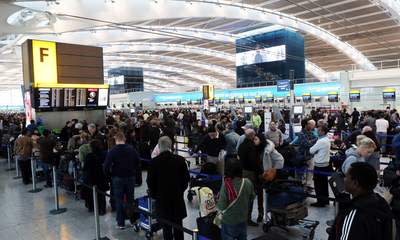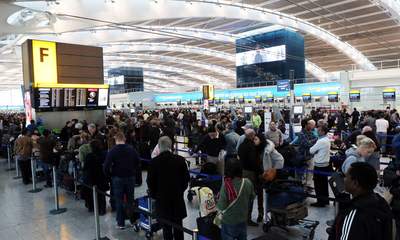Airfares: Heavier Passengers 'Should Pay More'
Airlines should make heavier passengers pay more for their plane tickets and lighter ones less, it has been suggested.
The controversial pay-as-you-weigh pricing scheme has been mooted by a Norwegian professor, who argues that weight and space should be taken into account by airlines pricing their tickets.
Writing in this month's Journal of Revenue and Pricing Management , Dr Bharat P Bhatta has put forward three proposals.
The first would see fares directly linked to the weight of a person and their belongings, with a fixed rate for kilograms per passenger.
Under this method, a person weighing 60kg (132lb or 9st 6lb) would pay half the airfare of a 120kg (264lb or 18st 12lb) person.
Dr Bhatta's second proposal involves charging a fixed base rate, with an additional charge for heavier passengers to cover the extra costs.
Every passenger could have a different fare according to this option.
The professor's final suggestion is for passengers to have the same fare if they have an average weight, but this could be discounted for weights below a certain limit or added to for excess weight above it.
This option would result in three types of fares: high, average and low.
Dr Bhatta, of the Sogn og Fjordane University College in Norway, thinks the third option is most suitable for implementation.
"Charging according to weight and space is a universally accepted principle, not only in transportation, but also in other services," he said.
"As weight and space are far more important in aviation than other modes of transport, airlines should take this into account when pricing their tickets."
Dr Ian Yeoman, editor of the Journal of Revenue and Pricing Management, threw his weight behind the suggestion.
"For airlines, every extra kilogram means more expensive jet fuel must be burned, which leads to CO2 emissions and financial cost," he said.
"As the airline industry is fraught with financial difficulties, marginally profitable and has seen exponential growth in the last decade, maybe they should be looking to introduce scales at the check-in."

 Yahoo News
Yahoo News 

